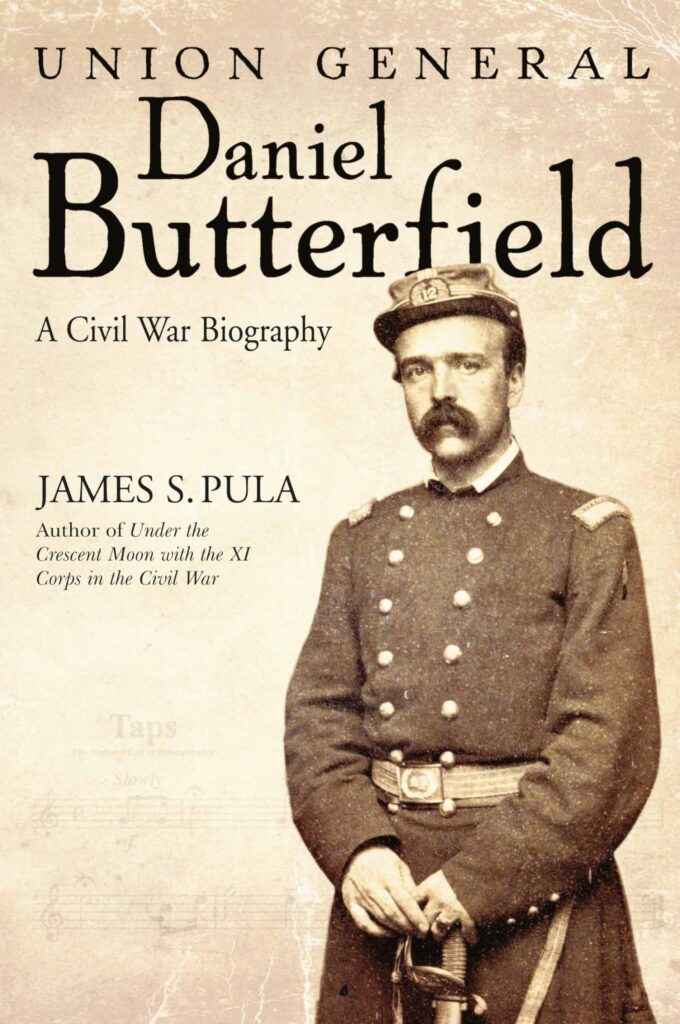By James. S. Pula.
El Dorado Hills, CA: Savas Beatie, 2024.
ISBN 978-1-61121-700-1. Photographs. Maps. Notes. Bibliography. Index.
Pp. xi, 268. $32.95.
In the early years of the war, Frank H. Norton wrote a song entitled “The Army of the Free” for Major General Fitz John Porter’s division of the Union III Corps. Set to music, “Army of the Free” has, as part of a verse, “We have Butterfield the daring; And we’ve Martindale the cool; Where could we learn the art of war, Within a better school…” (p. 202).
The story of Daniel Butterfield’s life and military career is thin with only one biographical work, the 1904 volume A Biographical Memorial of General Daniel Butterfield, Including Many Addresses and Military Writings, edited by his second wife, Julia Lorillard Butterfield. Fortunately for us, James Pula, author of numerous works including a multi-volume series on the Union XI Corps, turns his attention to Butterfield with Union General Daniel Butterfield: A Civil War Biography. While a relatively slim volume, Pula does great credit to the general’s memory and offers an engaging insight into an unfamiliar character.
Union Major General Daniel Butterfield is an enigma to most. Most readers would likely be aware of Butterfield from his involvement with the Army of the Potomac, but unless a student of the Western Theater, they may lose track of him at the close of the Gettysburg Campaign. He was slightly wounded, and after which, he was replaced, languishing until he was selected, once again, to serve under Major General Joseph Hooker, this time in the West.
Students of the Civil War and musicians primarily know him from his composition of the haunting melody of “Taps” with his brigade bugler, Oliver Wilcox Norton. Civil War enthusiasts may know also his role in creating the Army of the Potomac’s corps badge system, which allowed ready identification of formations and fostered a sense of camaraderie among the troops; his deep association with some of the more scandal-scarred leaders, namely Hooker and Major General Daniel Sickles, which tarnished his reputation for over 160 years; or his creation of an outpost manual that was lauded across the army.
Pula begins by briefly recounting the Butterfield family history and Butterfield’s young life to his selection as the colonel of the 12th New York State Militia. This first chapter alone gives readers a fine introduction to the impressive pre-war resume of a man not yet thirty years old. The next seven chapters showcase Butterfield’s military career in depth, describing an officer competent across multiple echelons of command and deeply attentive to the duties and responsibilities of leadership, even as he was not a professional military officer. He never attended West Point and befriended men considered “humbugs, intriguers, and demagogues” (p. 209). Despite this lack of formal military training, his rise through brigade, division, and corps command in less than six months can be described as meteoric, showcased by his earning the Medal of Honor at the Battle of Gaines’ Mill. While never an army commander, his impact as chief of staff to Major General Hooker in two armies where he made numerous innovative organizational changes that were readily lauded by superiors and men alike. Following Hooker to the Western Theater as chief of staff and division commander, illness would end Butterfield’s active command service in late summer 1864. Reverted to colonel in the Regular Army, within six years, he would resign his commission upon the death of his father.
Postwar, Butterfield resumed his successful business career and became a leading figure among veterans organizations. Despite not being a graduate of the U.S. Military Academy, Butterfield requested, and his wife Julia gained, permission for him to be buried there after he died in 1901, with a substantial monument erected to his memory.
Broadly illustrated with nearly fifty photographs and over a dozen maps by cartographer Hal Jespersen, Union General Daniel Butterfield provides a serious and thoughtful modern biography of a less visible personality whose impact was broadly felt across armies, in remembrance and memory, and to the nation writ large. Students and historians would do well to read this deeply researched and long-overdue biography. If rehabilitating Butterfield’s reputation was a goal of Dr. Pula, this volume certainly makes a solid case and raises the profile of an otherwise disregarded Civil War leader.
Lieutenant Colonel Paul H. Whitmore, USSF
King George, Virginia
